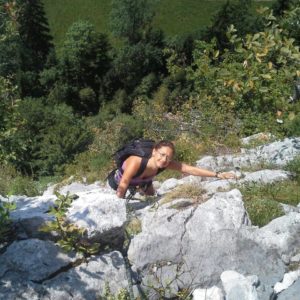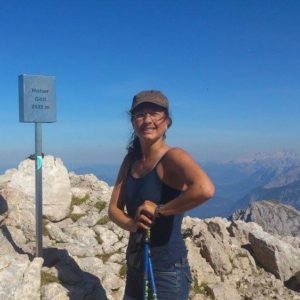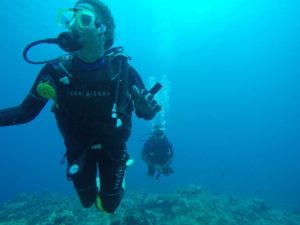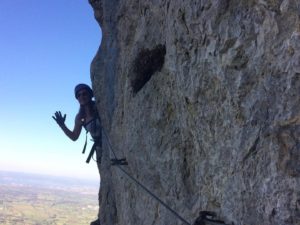Andrea is a phenomenally dynamic and giving person, full of energy and inspiration. She enjoys learning and in turn, sharing her knowledge with others in order to advance the physiotherapy practice as a whole. Andrea has been  volunteering with Physiopedia for a number of years and is now working toward her PhD on ethical practices within our profession. Please congratulate Andrea on her accomplishments, her ambitions and meaningful contributions to Physiopedia. Andrea is our Top Contributor for the month of August 2020. Well done Andrea, much deserved!
volunteering with Physiopedia for a number of years and is now working toward her PhD on ethical practices within our profession. Please congratulate Andrea on her accomplishments, her ambitions and meaningful contributions to Physiopedia. Andrea is our Top Contributor for the month of August 2020. Well done Andrea, much deserved!
Your name: Andrea Sturm
Time active with Physiopedia: I started volunteering for Physiopedia in 2017. I began with creating an ethics programme on Physioplus, which consisted of four individual courses in May 2017. The courses were officially launched a year later.
Current role with Physiopedia: Learning Architect with Physioplus.
Where did you go to university/college? I did my  undergraduate training at PRÄHA physiotherapy school in Kerpen, Germany. As I love learning and I am interested in many different fields, I also hold a Masters degree in “Spiritual Theology in Inter-religious Process” from the University of Salzburg and another in Education Sciences, from the Inter-University of Graz. I am also currently completing a PhD in Education Sciences from Graz as well.
undergraduate training at PRÄHA physiotherapy school in Kerpen, Germany. As I love learning and I am interested in many different fields, I also hold a Masters degree in “Spiritual Theology in Inter-religious Process” from the University of Salzburg and another in Education Sciences, from the Inter-University of Graz. I am also currently completing a PhD in Education Sciences from Graz as well.
Where do you work? In 2009, I founded a private physiotherapy practice in Hallein, a small town close to Salzburg, which focused on neurology and pediatrics. I handed over the clinic to a dedicated colleague last year, before I gave birth to our son, Patrik. At the moment I am on maternity leave. I am open to what the future has in store for me afterwards.Describe your role: As a clinician I love working with patients, both children and adults, who are affected by severe disabilities. This is the place where I feel I could contribute the most to an individual’s ability to participate in society, quality of life and luckily often, also progress. My heart also belongs to those who are marginalized, sometimes the neglected ones – and therefore becoming invisible to society. Persons with chronic, progredient neurological diseases, which disable and isolate them and their families over the years, as their conditions progress. Half of my clinical time is spent seeing patients who are bed- or wheelchair-bound in their homes, in many cases providing therapy as long as needed, or until they pass.
As a professional ethics teacher, I am not entirely sure who is actually learning the most from whom (I feel like both a teacher and a student!). From the international participants in the Physioplus courses, I am often inspired and touched in many ways, especially learning first-hand about cultural differences, but also similarities (e.g. in health care systems or patient’s regards), where I did not expect them at all.
And as a researcher focusing on ethics and ethical practices, I am passionate about discovering new themes or fields, using both my teaching and clinical experiences. As both my research and clinical backgrounds fuel me to further understand these processes and translate them into accessible practices. The older I become, the more I can see how different aspects and factors fall into place and how they truly fit together.

What is the most rewarding part of being a physiotherapist? For me, it is making a difference in a person’s life. When someone I work with feels that my contribution has changed something relevant in his or her life, or in the case of a child, if I was able to put things on the right track, so that their life evolves towards a better direction or a livable future, this truly makes me happy. I can barely find the words to describe this. Performing meaningful work, which has the potential to turn around a person’s life, is what I find the most rewarding part of working in our field.
I know these are “big words”, but in the case of someone suffering from a stroke or a family having a child with developmental disorders or gene-defects, you as the health care professional, are the one often responsible for first leading, and later guiding them, on their journey until they are able to travel solo. For this kind of trust from my patients, in my abilities and professional responsibilities in supporting them on their journey – I am truly grateful.
What are some of the more challenging aspects about being a physiotherapist? As I work in palliative care settings, I too, have difficulties in not taking home the often unbearable suffering of my patients. I have experienced it a couple of times, when I have treated either persons younger than me, and also children, that I needed to take time away when they died, because it really affected me. But I guess that is the price of the privilege of bearing witness to someone’s life. I never understood the professional’s role as a shield to hide behind, but rather learned to embrace life, with all its complexities and challenges.
 What are some of your professional passions? Hmm, good question. I am passionate about so much! Professional ethics for example, is one field where I cannot get enough. Once I sink my teeth into something interesting, I must dive into it until I feel that I really understand the topic; it’s interrelatedness and the implications. Unfortunately, the time I have is barely enough to satisfy my thirst for learning. But my little son now teaches me how to let go of any attempt for perfection.
What are some of your professional passions? Hmm, good question. I am passionate about so much! Professional ethics for example, is one field where I cannot get enough. Once I sink my teeth into something interesting, I must dive into it until I feel that I really understand the topic; it’s interrelatedness and the implications. Unfortunately, the time I have is barely enough to satisfy my thirst for learning. But my little son now teaches me how to let go of any attempt for perfection.
What are a few of your personal passions? Oh, I am an absolute sports addict! In the summer I climb, dive and paraglide with my partner. Last year, I discovered stand-up paddling, which I did until the end of the 7th month of my pregnancy. I am also a passionate runner for the last 25 years. I also ski – backcountry, cross-country and downhill – during the winter months. And I love reading good literature and learning about other cultures, countries and wildlife.
What would be your advice to a newly graduating physiotherapist? Do not underestimate the worth of a respectful relationship with your patient, based on mutual trust and understanding. Professional techniques and knowledge is one thing, but becoming real and humane, is equally important. Especially in situations where time and money seems to become more important than people and connections. Challenge what you find in front of you when entering the profession, and if you are not happy with it, actively contribute to the change you would like to see.
Where do you see yourself in 5 years? Hopefully on the first day of school for our son. For the rest of it, I have stopped making plans, as everything that I once thought would be, turned out to be totally different. Therefore, I have decided to go with the flow, and to see, where life will lead me. I am sure I will not become bored!
 What are the best things about being a Physiopedia volunteer? Giving something back to the profession, which has given me so much over the years. Learning from others on an international level and having fun together. What is unique at Physiopedia, is Rachael’s ability to offer the space someone needs to bring out their best. You certainly do not find that very often.
What are the best things about being a Physiopedia volunteer? Giving something back to the profession, which has given me so much over the years. Learning from others on an international level and having fun together. What is unique at Physiopedia, is Rachael’s ability to offer the space someone needs to bring out their best. You certainly do not find that very often.
How has being a Physiopedia volunteer helped your professional development/career progression? It’s their (Rachael & Tony!) fault that I am working towards a PhD now. While I was creating a worldwide ethics course, I asked myself: Why not also conduct research on ethics on an international level?
So one thing led to another, and here I am now – right in the middle of an exciting journey! I would have never thought about doing this, if not for the preparations of the ethics programme for Physioplus.
What are your hopes and aspirations for Physiopedia? Physiopedia will be able to provide/create an online graduate or postgraduate university programme, accessible and feasible for people from all kinds of economic and cultural backgrounds. They have already laid the cornerstone for global physiotherapy education, and I strongly hope that Physiopedia will continue to move in that direction.
What is your favourite Physioplus course? The Cerebral Palsy course. I was so keen that I just couldn’t stop learning! I rushed through the programme like there was no tomorrow!
Anything else you would like to share? Yes. If someone is interested in participating in our current ethics study, I would be delighted to hear from you. We are looking for colleagues from all over the world, who would be willing to share their experiences concerning ethical decision-making in an online interview with us. Click here, if you are interested in participating in, or learning more about the study.
Click here to learn more about the Ethics Programme on Physioplus
How Do I Become a Volunteer?
All our volunteers complete the Volunteer Orientation Course, the next course starts on Monday 7 September! Following successful completion of this course all our volunteers complete six months on the content development team. This consolidates all that you have learned on the course and gives you an opportunity to demonstrate where your unique skills and interests lie. After your six month review you are provided with a specific role that suits this skills that you have demonstrated plus your individual qualifications, experience and interests. If you would like to join this course please click on the button below and join us for an amazing journey!
Sign up for the next Volunteer Orientation Course here
